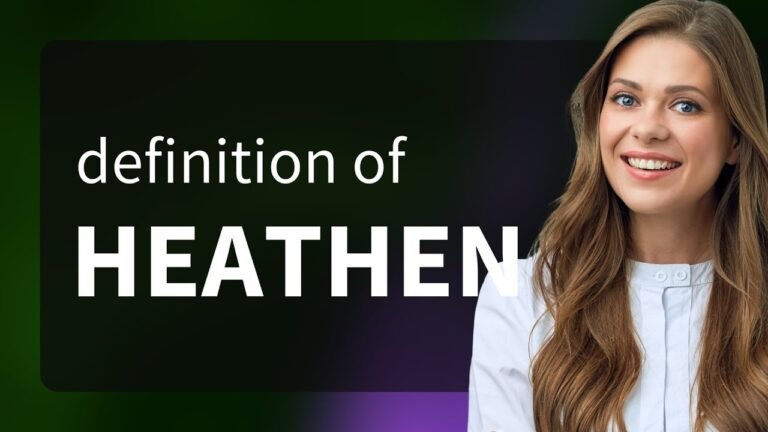Understanding the Meaning of Heathen
The term heathen has evolved significantly over centuries, often used to describe individuals or groups outside the mainstream religious beliefs of a particular society. Originally rooted in early Christian contexts to label non-Christians, it now encompasses a broader spectrum of meanings, reflecting cultural, spiritual, and philosophical identities. As society becomes increasingly diverse, understanding the nuanced implications of heathen invites a deeper exploration into themes of belief, belonging, and the human experience. This article delves into the rich history and contemporary interpretations of the word, shedding light on its multifaceted significance in today’s world.
What is the true meaning of heathen?
Heathen traditionally refers to someone who does not belong to a widely held religion, often viewed as uncivilized or lacking in cultural values.
What is the meaning of being referred to as a heathen?
Being called a heathen typically refers to someone who is not affiliated with major world religions like Judaism, Islam, or Christianity, highlighting a perceived lack of religious belief. Additionally, the term can carry a connotation of uncultured behavior, suggesting a departure from societal norms and values. While its usage has diminished over time, it still evokes a sense of otherness, reflecting cultural and religious biases that have evolved throughout history.
Does heathen refer to an atheist?
Heathen is a term historically associated with those who reject the gods of Judaism, Christianity, and Islam, often used interchangeably with infidel or pagan. However, it does not strictly equate to atheism, as it primarily describes someone who does not adhere to the major monotheistic faiths rather than a complete disbelief in any deity. In contemporary usage, the term can carry a lighthearted connotation, with some atheists playfully identifying themselves as heathens, showcasing the evolving nature of language and belief.
What is a word that means the same as heathen?
A synonym for “heathen” often encompasses terms that reflect a lack of religious belief or adherence. Words like “irreligious,” “pagan,” and “godless” capture the essence of those who may not follow established religious practices or beliefs. These terms can convey a sense of cultural or spiritual detachment, highlighting a divergence from mainstream faith.
In broader contexts, additional synonyms such as “agnostic,” “atheistic,” and “profane” expand the understanding of what it means to be considered a heathen. These words can also evoke a sense of being uncultured or barbaric, suggesting a rejection of societal norms surrounding spirituality. Together, these synonyms paint a vivid picture of the term’s nuances and implications in various discussions about belief and culture.
Exploring Cultural Roots and Misconceptions
Cultural roots shape our identities and influence our perspectives, yet many misconceptions cloud the appreciation of diverse traditions. As we delve into the rich tapestry of global cultures, it becomes evident that understanding these roots fosters empathy and connection. By exploring the historical context and values embedded within various cultural practices, we can dispel myths and celebrate the uniqueness of each tradition.
Misunderstandings often arise from stereotypes and oversimplified narratives, leading to a fragmented view of cultures. For instance, the intricate rituals of a community may be reduced to mere caricatures, stripping away their significance and depth. Engaging with authentic voices and firsthand experiences allows us to appreciate the complexity of cultural expressions, encouraging dialogue that honors the nuances rather than perpetuating misconceptions.
Ultimately, embracing our cultural roots and examining our biases opens the door to a more inclusive society. By prioritizing education and respectful discourse, we can cultivate a deeper understanding of one another. This journey not only enriches our lives but also paves the way for meaningful connections that transcend borders, fostering a world where diversity is celebrated rather than feared.
The Evolution of a Controversial Term
Throughout history, the term “fake news” has undergone a significant transformation, evolving from a relatively obscure phrase used to describe fabricated stories to a contentious label wielded in political discourse. Initially coined to address sensationalized journalism that misled the public, its meaning has expanded, often being weaponized to dismiss any unfavorable reporting. This shift reflects a broader cultural struggle over truth and misinformation in the digital age, where social media amplifies both the spread of deceptive narratives and the debate surrounding media credibility. As society grapples with the implications of this evolution, the term now encapsulates complex discussions about trust, accountability, and the very foundations of our information landscape.
Bridging Beliefs: From Isolation to Inclusion
In a world increasingly divided by differing beliefs, the journey from isolation to inclusion becomes essential for fostering harmony. People often find themselves trapped in echo chambers, where opinions are reinforced rather than challenged. This isolation not only stifles personal growth but also cultivates an environment of misunderstanding and animosity. By acknowledging our differences and embracing open dialogue, we can dismantle these barriers and pave the way for a more inclusive society.
Engaging in conversations with those who hold contrasting views can be enlightening, revealing the shared values that lie beneath our diverse perspectives. When we approach discussions with empathy and curiosity, we create opportunities for connection and understanding. This practice not only humanizes our opponents but also enriches our own beliefs, encouraging personal transformation and collective progress. Inclusion thrives on the recognition that every individual has a unique story worth hearing.
Ultimately, bridging beliefs requires a commitment to vulnerability and respect. It challenges us to step outside our comfort zones and confront our biases. By fostering environments where dialogue is encouraged, we cultivate communities where everyone feels valued and heard. This shift from isolation to inclusion not only empowers individuals but also strengthens the fabric of society, reminding us that we are more alike than we are different.
Understanding the meaning of heathen goes beyond its historical connotations; it invites a deeper conversation about culture, belief, and identity. As society evolves, so too does the interpretation of terms that once held rigid definitions. Embracing a broader perspective allows us to challenge stereotypes and foster dialogue, ultimately enriching our collective understanding of what it means to be human in an increasingly diverse world.





